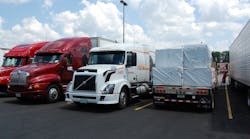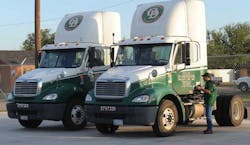With the Environmental Protection Agency (EPA) poised to roll back ambitious corporate average fuel economy (CAFE) standards put in place by the Obama administration nearly six years ago – standards automakers claimed would’ve saddled them with $200 billion in compliance costs over the next 10 years – there’s more than a little out-loud musing as to whether something similar might be attempted for the Phase 2 greenhouse gas (GHG) rules governing heavy trucks, trailers and diesel-powered pickups.
Right now, the betting in the main seems that the Phase 2 GHG rules won’t be scaled back to the degree being witnessed for the CAFE standards and for perhaps the best reason: long-haul truckers especially could gain a lot of fuel savings.
At the 2017 Technology & Maintenance Council (TMC) annual meeting last week, a wide range of presentations delved into the costs and potential benefits associated with the Phase 2 GHG rules, much less their impact on specific items such as tires, wheels, and trailers.
But I think Wade Long – director of product marketing for Volvo Trucks North America (VTNA) – summed up the possibilities proffered by the Phase 2 GHG rules indirectly during a separate discussion regarding Department of Energy (DOE) funded “Super Truck” projects.
He noted that Volvo’s Super Truck project achieved an average of 12 mpg in comparison to the 7 mpg notched by a 2009 model Volvo VNL tractor and standard trailer used as a “baseline” for comparative measurement.
That 5 mpg difference translates into about $17,000 worth of fuel savings per truck per YEAR, Long emphasized. That would be more than enough to offset the predicted direct costs of the Phase 2 GHG rules, which EPA estimated to be as follows: upfront price increases of some $11,700 for tractors, $1,200 for trailers, $3,400 for vocational vehicles, and $1,300 for pickups/vans.
[FYI: those costs would be felt in the wallets of fleets mainly during the implementation of the 2021 and 2024 portions of the Phase 2 GHG standards.]
Now, certainly, not all the technologies and tweaks deployed for Super Trucks can be directly transitioned onto commercial vehicles operating in the real world. Yet those Super Trucks are the “test beds” upon which OEMs determine whether fuel-saving improvements make the grade in terms of practicality, payback, reliability, etc.
“Consistency” is another watchword for truck and trailer OEMs where the Phase 2 GHG rules are concerned as well, noted Patrick Dean, chief engineer for Kenworth Truck Co. during TMC last week.
“Right now, the regulation is consistent across EPA and CARB, and I for one hope it stays consistent—because I know that CARB will not back off,” he explained.
“If we do have a reduction in the regulation on the EPA side, we might end up with a multi-state requirement that will be challenging and, certainly from a technology perspective and from an OE perspective, we’re going to have to hit the most stringent requirement set,” Dean stressed. “If we’re going to be struggling to offer a bunch of different emissions configurations, I just don’t see that being practical.”
There’s something else to consider as well: the impact on operating costs, especially in terms of maintenance, as trucks and trailers are retooled to comply with the Phase 2 rules.
Thomas Newby, vice president of equipment and maintenance for LTL carrier Old Dominion Freight Line (ODFL), highlighted during a presentation at TMC how the nearly decade-long effort to reduce diesel particulates and oxides of nitrogen from truck exhaust affected his fleet’s costs.He noted that while fuel economy for his fleet’s trucks dropped 4.9% between 2004 and 2007, it increased 3.3% between 2007 and 2010 and increased another 12.4% between 2010 and 2016 as improvements were gradually made to exhausts emission control systems – resulting in a net 10.8% overall gain in fuel economy.
However, despite those fuel savings, cost per mile (CPM) for ODFL’s fleet kept right on rising – no doubt in part to the more complex maintenance needs of emission control technology and related components, as well as for the higher sticker prices of newer “cleaner” trucks, too
Newby noted that ODFL’s CPM increased 10.1% between 2004 and 2007, jumped another 12.7% between 2007 and 2010, before leaping up another 12.1% between 2010 and 2016.
He also pointed out something else about the Phase 2 GHG rules, too: that they’ve likely “set a record” for rules that look the farthest into the future; all the way out to 2027, to be precise.
And could that long time line be but one reason for the Trump administration to possibly reconsider the Phase 2 GHG regulatory package? That remains to be seen. Besides, we’ve got to see if they get the rollback of the CAFE standards completed first.






